|
|
|
Sort Order |
|
|
|
Items / Page
|
|
|
|
|
|
|
| Srl | Item |
| 1 |
ID:
189860
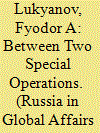

|
|
|
|
|
| Summary/Abstract |
In July 2021, six months before the start of the special military
operation (Russian official acronym SVO) in Ukraine, the Russian
president published an article titled “On the Historical Unity of
Russians and Ukrainians,” in which he actually substantiated in detail
the inevitability of the future campaign. “Step by step, Ukraine was
dragged into a dangerous geopolitical game aimed at turning it into
a barrier between Europe and Russia, a springboard against Russia.
Inevitably, there came a time when the concept of ‘Ukraine is not
Russia’ no longer suited the purpose. There was a need for the ‘anti-
Russia’ concept which we will never accept,” wrote Vladimir Putin. And
further he wrote:
|
|
|
|
|
|
|
|
|
|
|
|
|
|
|
|
| 2 |
ID:
087988
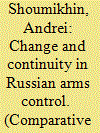

|
|
|
|
|
| Publication |
2009.
|
| Summary/Abstract |
Russian arms control is not a brand new creation disembodied from the past but is heavily influenced by the history of arms control in the Soviet era. Tracing the evolution of Russian thinking from the days of Stalin, through the arms control boom of the 1970s, to the reforms of Gorbachev and the Soviet disintegration, this article flushes out the Soviet perspective on issues such as strategic stability and the use of treaties to slow an adversary's technological advancement. Further, this article relates the influence of Soviet opinion to current-day thinking in the Russian Federation (RF). As the U.S. and the RF prepare to tackle tough issues, like the expiration of the Strategic Arms Reduction Treaty in 2009, these viewpoints become particularly salient.
|
|
|
|
|
|
|
|
|
|
|
|
|
|
|
|
| 3 |
ID:
137951
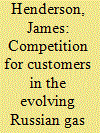

|
|
|
|
|
| Summary/Abstract |
Significant change is occurring in the Russian gas sector as the arrival of new entrants is creating the conditions for a gradual evolution of the domestic gas market towards a more competitive environment based upon the commercial realities facing the Russian gas industry. Non-Gazprom producers are increasingly adopting more aggressive marketing strategies to ensure that they create a market for their expanding gas production in a market where demand is constrained. State-controlled Gazprom has yet to demonstrate any significant response to this competitive threat, implying that its position could be significantly undermined over the next few years.
|
|
|
|
|
|
|
|
|
|
|
|
|
|
|
|
| 4 |
ID:
153498
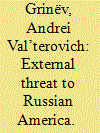

|
|
|
|
|
| Summary/Abstract |
Many researchers believed that the external threat to Russian colonies in Alaska was the main reason for the sale of Russian America to the United States in 1867. Our research demonstrates that the Russian colonies were in real danger of external invasion only three times: during the Russo-Sweden war (1788–1790), Anglo-Russian war (1807–1812), and Crimean (East) war (1853–1856). But every time, Russian America avoided military clashes. The days before 1867 (when Alaska was sold to the USA), the international situation was favorable, especially for the safety of Russian colonies. Besides, the latter were not entirely defenseless, having some military force (soldiers, navy sailors and officers, heavy cannons, and armed ships). Thus the external threat to Russian colonies is exaggerated in scholarly literature.
|
|
|
|
|
|
|
|
|
|
|
|
|
|
|
|
| 5 |
ID:
093729
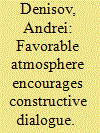

|
|
|
|
|
| Publication |
2009.
|
| Summary/Abstract |
A. I. Denisov: Mr. Obama has completed his initial period in office as president of the United States. To be more accurate, nine of 48 months of his first presidential term have passed. It is a considerable period, and as far as we know, the basic parameters of US policy, the policy of the Democratic administration, have already been finalized or are close to finalization. This also applies to its policy with regard to Russia. On the one hand, it is too soon to sum up the first results of the "resetting" of relations, because the "resetting" process continues, going through a fairly active phase. On the other hand, something definitive has already been accomplished. This refers primarily to the climate, the atmosphere of our relations. One should not underestimate this apparently immaterial factor, because only a favorable atmosphere makes it possible to conduct constructive dialogue aimed at achieving what in political science is known as a "win-win" formula - i.e., a situation that is advantageous to both sides.
|
|
|
|
|
|
|
|
|
|
|
|
|
|
|
|
| 6 |
ID:
118652
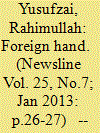

|
|
|
| 7 |
ID:
170598
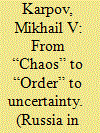

|
|
|
|
|
| Summary/Abstract |
The article describes how social and political changes in post-Soviet Russia over the past quarter of a century have been read and assessed by Chinese experts in relevant fundamental monographs. Each of the monographs considered herein, published in China twelve years apart, reviews different stages in the evolution of Chinese experts’ approach towards Russia, and states their analytical, ideological and political conclusions. Generally speaking, China’s sociopolitical Russian studies have evolved from the ideologically motivated resentment against the Soviet Union’s dissolution, the disbandment of its Communist Party and the ensuing shock reforms of the 1990s to the recognition of irreversible changes in Russia and “legitimization” of the Russian leadership in the 2000s-2010s. However, by the end of the current decade, the topic of uncertainty about Russia’s future sociopolitical and economic development has once again surfaced in some key publications along with increasingly “panegyrical” assessments of the Russian president.
|
|
|
|
|
|
|
|
|
|
|
|
|
|
|
|
| 8 |
ID:
084443
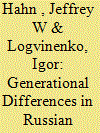

|
|
|
|
|
| Publication |
2008.
|
| Summary/Abstract |
The purpose of this article is to explore whether there is evidence of generational differences in Russian attitudes towards democracy. Are the attitudes, values and beliefs of those who came of age politically after the fall of the Soviet Union significantly different from those who did so in the Soviet period? The main finding is that the post-Soviet generation of Russians is generally more supportive of democratic values and institutions and a free market economy than the generations which came of age politically during the Soviet years. Such a result is not surprising. However, while support was found to be the case generally, the differences appear much more strongly for economic reforms than for political ones. In trying to explain why this should be, the authors argue that instrumentalist rather than culturalist considerations are paramount. Put another way, the current generation appears to be less interested in politics than in getting ahead in the world. If these differences are generational and not simply a function of aging, in the future this generation may be less interested in the public good than in their own.
|
|
|
|
|
|
|
|
|
|
|
|
|
|
|
|
| 9 |
ID:
101638
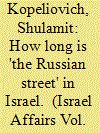

|
|
|
|
|
| Publication |
2011.
|
| Summary/Abstract |
The article illuminates a sociolinguistic aspect of the large wave of immigration from the Former Soviet Union to Israel in the 1990s. It also investigates the discrepancies between the declared linguistic ideology, language management strategies, and actual language practices. The ubiquitous presence of Russian in the Israeli public sphere goes hand in hand with the rapid shift from Russian to Hebrew in the second generation of immigrants. The article discusses future perspectives of the maintenance of Russian in Israel through coordinating family efforts to preserve the immigrant heritage and multilingual educational policy at the state level.
|
|
|
|
|
|
|
|
|
|
|
|
|
|
|
|
| 10 |
ID:
169696
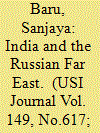

|
|
|
|
|
| Summary/Abstract |
Prime Minister Narendra Modi was the Chief Guest at the fifth meeting of the Eastern Economic Forum (EEF) held at Vladivostok, Russia in early September 2019. The Prime Minister’s participation in this meeting underscored India’s growing interest in building closer economic ties with the Russian Far East. India and Russia have long shared geopolitical perspectives on the balance of power across Eurasia. In the post-Cold War era, both turned their attention to the West. However, over the past decade India has pursued a “Look East Policy”, seeking to regain its political and economic influence in South-east Asia and building new strategic partnerships with East Asian powers like Japan and South Korea. Russia’s ‘pivot to the East’ and India’s move from ‘Look East’ to ‘Act East’ have created a new framework for closer India-Russia geo-economic and geopolitical relations.
|
|
|
|
|
|
|
|
|
|
|
|
|
|
|
|
| 11 |
ID:
141549
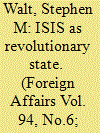

|
|
|
|
|
| Summary/Abstract |
ISIS, seems uniquely baffling and unusually dangerous . According to its leaders’ own statements, the group wants to eliminate infidels, impose sharia worldwide, and hasten the arrival of the Mahdi. ISIS' foot soldiers have pursued these goals with astonishing cruelty. Yet unlike the original al Qaeda, which showed little interest in controlling territory, ISIS has also sought to build the rudiments of a genuine state in the territory it controls. It has established clear lines of authority, tax and educational systems, and a sophisticated propaganda operation. It may call itself a “caliphate” and reject the current state-based international system, but a territorial state is what its leaders are running. As Jürgen Todenhöfer, a German journalist who visited territory in Iraq and Syria controlled by ISIS, said in 2014, “We have to understand that ISIS is a country now .”
|
|
|
|
|
|
|
|
|
|
|
|
|
|
|
|
| 12 |
ID:
128083
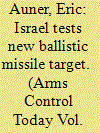

|
|
|
|
|
| Publication |
2013.
|
| Summary/Abstract |
Israel on Sept. 3 conducted the first flight test of a new missile defense target designed to improve Israeli defenses against longer-range ballistic missiles. The unannounced launch of the target, designed to simulate medium-range ballistic missiles like those possessed by Iran, was detected by Russian radar and reported in Russian media.
Israel, which initially claimed that it was unaware of a missile launch over the Mediterranean Sea after it was reported in the Russian media, said the test of the Silver Sparrow ballistic missile defense target was long planned. The Israeli Ministry of Defense issued a statement on its Facebook page saying that the missile defense radar successfully detected and tracked the launch and transferred flight data to the battle management system.
|
|
|
|
|
|
|
|
|
|
|
|
|
|
|
|
| 13 |
ID:
142762
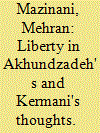

|
|
|
|
|
| Summary/Abstract |
Here I examine the modern idea of liberty in works of Akhundzadeh and Kermani – two leading Iranian intelligentsia under the Qajar Iran (1794–1925). In doing so, first, I set forth a brief (intellectual) background that shows some of the influences of Iranian, Russian, and European scholars on Akhundzadeh and Kermani. Then, their thoughts will be represented systematically by following a simple theoretical framework driven from their works. Applying one model to both cases particularly helps to demonstrate their similarities and differences, as well as how fundamentally different was their understanding of liberty from their contemporaries. To Akhundzadeh and Kermani, life under the Qajars resembled the lawless state of nature, transcending which, however, required more than establishing laws. For the transcendence to occur, a revolution in mind was needed; and for that matter to happen, liberty was a critical prerequisite and consequence.
|
|
|
|
|
|
|
|
|
|
|
|
|
|
|
|
| 14 |
ID:
192611
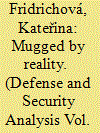

|
|
|
|
|
| Summary/Abstract |
This article discusses the surprising lack of preparedness in Russian propaganda preceding the invasion of Ukraine on February 24, 2022. Despite previous successes in developing strategic narratives during the annexation of Crimea, Russia underestimated the need for unique communication strategies for the conflict in Ukraine. The article argues that Russia's miscalculation was due to the assumption that it already had a set of strategic narratives in place, from the international order to specific issues, and viewed the conflict as a continuation of the story it had already told. However, increased scrutiny from Western media and academia led to a reexamination of assumptions and attitudes towards the region. Instead of Russia adapting its strategic narrative for a Western audience, it fell back on the existing one, further alienating the audience. This chapter highlights the importance of strategic narrative in international conflicts and its complex relationship with audience perception.
|
|
|
|
|
|
|
|
|
|
|
|
|
|
|
|
| 15 |
ID:
132588
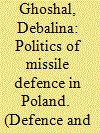

|
|
|
|
|
| Publication |
2014.
|
| Summary/Abstract |
As Poland is fielding the US missile defence system in its territory, it is also simultaneously working on its own missile defence system due to the trust deficit with the United States. The Ukranian crisis and the integration of Crimea into Russia have prompted Poland to beef up its missile defence programme. However, as Warsaw strives to modernise its missile defence capabilities, this article would aim to study the politics of fielding a missile defence system in Poland from certain important dimensions.
|
|
|
|
|
|
|
|
|
|
|
|
|
|
|
|
| 16 |
ID:
160144
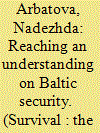

|
|
|
|
|
| Summary/Abstract |
In negotiating a Baltic settlement, Russian and Western politicians must choose from among realistic options, and deal with the partners they have.
|
|
|
|
|
|
|
|
|
|
|
|
|
|
|
|
| 17 |
ID:
084939


|
|
|
|
|
| Publication |
2008.
|
| Summary/Abstract |
The collapse of the Soviet Union raised concerns about the fate of its nuclear weapons and led the United States to fund what came to be known as Cooperative Threat Reduction (CTR). This includes programs that fight the proliferation of weapons expertise by providing short-term income and eventual re-employment of former Soviet WMD experts in civilian fields. Using case studies, based on archival research and extensive interviews, this article argues that CTR's three main 'knowledge non-proliferation' efforts have largely failed at their given task. Although programs have worked with many former Soviet WMD experts, few have been re-employed. Each program has also come to emphasize the number of people engaged rather than re-directed and to have less regard for their WMD skills. Moreover, this shift in goals, and the metrics each program uses to measure progress, led to serious political disputes between Moscow and Washington. Besides being unable to demonstrate success at their original non-proliferation goals, these programs use metrics that threaten to upset the fragile US domestic political consensus for future work in Russia.
|
|
|
|
|
|
|
|
|
|
|
|
|
|
|
|
| 18 |
ID:
147953
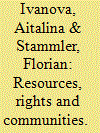

|
|
|
|
|
| Summary/Abstract |
Industry in the twenty-first century advances to ever-remoter regions, seen as ‘periphery’ from the point of view of headquarters and capital cities, while for local people these areas are the core of their world. This article investigates the encounter between communities, regulatory authorities and industry in the Russian Arctic. Using cases from Sakha (Yakutiya), we analyse how communities organise for coexistence of traditional livelihoods with big industrial projects in what we call state-led resource development. Our analysis shows the surprising room for agency that development agendas in a centralised state nonetheless leave for local people so far.
|
|
|
|
|
|
|
|
|
|
|
|
|
|
|
|
| 19 |
ID:
138542
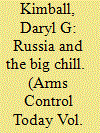

|
|
|
|
|
| Summary/Abstract |
Since the 2014 ouster of the pro-Russian president of Ukraine, Russian President Vladimir Putin’s persistent effort to annex and destabilize parts of Ukraine has undermined European security and the rules-based international order. The Ukraine crisis has sent already chilly relations between Moscow and the West to the lowest point in more than a quarter century.
|
|
|
|
|
|
|
|
|
|
|
|
|
|
|
|
| 20 |
ID:
097762
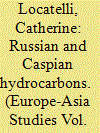

|
|
|
|
|
| Publication |
2010.
|
| Summary/Abstract |
The issue of EU gas supply security has become more and more important in the 2000s in the context of gas market liberalisation and the question of the reliability of Russia as a supplier. One answer to these problems is EU gas diversification, specifically the opening up of a fourth gas corridor to supply the EU with gas from Central Asia via the 'Caucasus' or 'southern' route. The feasibility of this strategy might now be called into question. This article reviews the new strategies that could emerge in the producing countries as well as those of international oil companies, and then examines what the consequences might be as far as the EU's diversification strategy is concerned. The article identifies some of the problems and limits of these strategies.
|
|
|
|
|
|
|
|
|
|
|
|
|
|
|
|
|
|
|
|
|